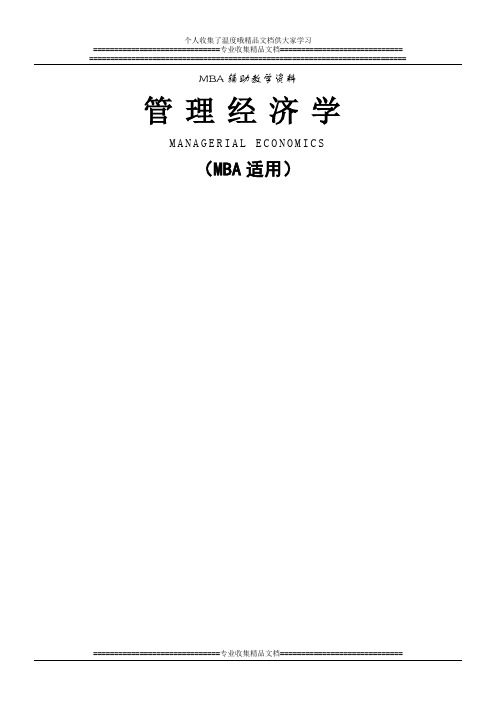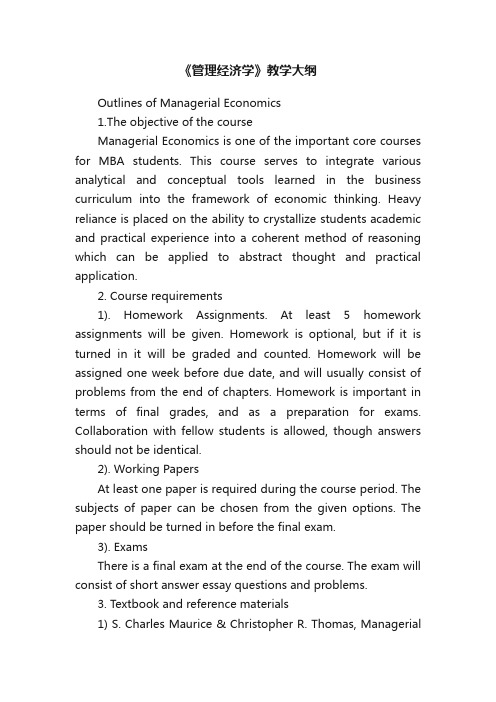管理经济学大纲Managerial Economics Syllabus
《管理经济学》课程教学大纲

《管理经济学》课程教学大纲一、课程名称管理经济学(Managerial Economics)二、学时与学分学时:40 学分:2.5三、授课对象工商管理专业、会计学专业四、先修课程高等数学五、教学目的管理经济学课程是管理专业学生的学位课,它是一门把微观经济学原理和分析方法用于企业经济管理决策的学科。
其教学目的,一是为企业的管理决策实践提供经济理论和经济分析的思想框架;二是使学员了解企业在市场经济体制中的地位,使企业的决策能够更好地适应于市场体系。
六、主要内容及基本要求在教学计划中,管理经济学是一门业务理论基础课。
它一方面是为各门专业管理课打下业务理论基础; 另一方面又对各门专业管理课起综合作用, 说明它们如何配合才能实现企业的目标。
1、绪论(第一章)1)经济学、微观经济学与管理经济学的关系;2)管理经济学和经济体制;3)机会成本的概念与计算;4)管理经济学研究方法:抽象分析法、均衡分析法、边际分析法、数量经济模型。
基本要求:(1)管理经济学。
管理经济学是一门研究如何把微观经济学的理论和经济分析方法用于企业管理决策实践的学科,是一门应用科学。
(2)机会成本。
机会成本是指,如果一项资源既能用于甲用途,又能用于乙用途,那么资源用于甲用途的机会成本,就是资源用于次好的,被放弃的其他用途本来可以得到的净收入。
(3)会计利润和经济利润。
会计利润=销售收入-会计成本经济利润=销售收入-机会成本=销售收入-机会成本-正常利润(4)边际分析法和边际效用递减规律。
边际效用递减规律是指,在一定时期内,消费达到一定水平后,消费者消费某一商品的边际效用随着数量的增加而减少。
学习建议:自主学习和视频课堂3学时,练习1学时。
作业:1、一台设备可用来生产A产品,也可用来生产B产品,但是若生产其中一种,就必须放弃另一种。
与两种产品生产有关的一个计划期的数据如下。
(1)生产A、B两种产品的会计利润为多少?(2)生产A、B两种产品的经济利润为多少?2、某企业今年计划使用钢材10万吨,仓库里面有前年购入的钢材3万吨,单价为1200元/吨;有去年购入的钢材5万吨,单价为1500元/吨;还有今年购入的钢材5万吨,单价为1600元/吨。
《管理经济学》课程大纲

《管理经济学》课程大纲(Managerial Economics)一、课程基本信息二、课程教学目标及要求(一)教学目标管理经济学课程是MBA专业和MPACC专业的专业基础课,它是一门把经济学原理和分析方法应用于企业经营管理决策的学科,其教学目的是为了提高学生在市场经济条件下管理决策的能力和水平。
1.熟悉并掌握管理经济学的基本理论和方法,培养管理经济学的理论逻辑与思维方式;2.能够运用经济学的基本理论和方法,解释、分析并解决管理中的现象与问题;3.掌握管理经济学的分析和预测工具,指导利润最大化的企业决策,以及为企业战略决策提供博弈分析框架和技术手段。
(二)教学要求作为专业学位硕士研究生培养计划中的一门业务理论基础课,它的开设时间一般先于其他管理类专业课,一方面要为以后的各门管理专业课打下理论基础,另一方面又对各专业课起到综合和衔接作用,说明它们如何配合才能实现企业的目标。
管理经济学教学要充分体现理论结合实际的原则,培养学生分析和解决问题的能力。
分析问题的能力是将具体现象和问题抽象出本质的理论归纳能力,解决问题的能力是将理论运用于复杂的实践的理论应用能力。
在教学中运用案例式教学、模拟式教学、讨论式教学等实践教学方法。
三、教学内容第一部分管理经济学概述该专题主要教授管理经济学的基本概念、思维范式、基本流派和研究方法。
通过概述式的俯瞰管理经济学全貌,引导学生进入管理经济学的思维逻辑与分析语境。
1.思考与讨论的问题(1)经济学是什么?经济学对于管理实践而言,是什么?(2)经济学的思想发展轨迹对管理学思维的启示?(3)经济学的研究方法及其在管理上的应用。
2.案例分析“漫无边界”——原创动力的无边界经营3.作业与讨论“机会成本”及其在管理实践中的应用4.建议阅读的文献(1)克里斯托弗 R 托马斯:《管理经济学》,机械工业出版社, 2014(2)詹姆斯.布里克利:《管理经济学》,人民邮电出版社,第四版,2011(3)曼昆:《经济学原理》,清华大学出版社,第四版,2012(4)范里安:《微观经济学现代观点》,格致出版社,第七版,2009(5)赵晓雷:《中国经济思想史》,东北财经大学出版社,第三版,2014(6)王福重:《人人都爱经济学》,人民邮电出版社,2012第二部分需求该专题主要讲授需求规律、影响需求的因素、弹性及其种类、行业需求与企业需求,以及需求与弹性在决策中的应用等内容。
管理经济学课程大纲

MBA辅助教学资料管理经济学M A N A G E R I A L E C O N O M I C S(MBA适用)《管理经济学》教学大纲(COURSE OUTLINE)课程编号(COURSE NUMBER):课程名称(COURSE NAME):管理经济学(MANAGERIAL ECONOMICS)学时学分(STUDYING HOURS AND SCORE):32/2先修课程(ASSUMED KNOWLEDGE):---------------------------------------------------------------------一、课程描述(COURSE DESCRIPTION)管理经济学是一门应用经济学。
它以微观经济学为理论基础,借助于决策科学的各种方法和工具,指导企业决策者高效率地配置稀缺资源,制定和实施能使企业目标得以实现的经营决策,更有效地管理与客户、供应商、竞争者和互补生产商的关系。
本课程介绍基本的微观经济学原理,包括边际分析、市场竞争力、定价策略和组织分析方面的原理。
二、课程教学目标(COURSE OBJECTIVE)竞争和企业价值最大化是管理经济学研究中始终围绕的两个主题。
管理经济学的教学服务于三个目标:1.运用经济学的方法思考和解决企业决策问题,为企业决策提供一个逻辑分析方法;2.使学员精通和掌握经济学中涉及协调和配置企业活动和资源的范畴、方法和分析工具,为思考和分析适用于更多企业具体活动和问题的管理决策提供一个有效的决策思维方法;3.使学生能够将所学的知识运用到企业战略性的决策分析中。
三、教学主要内容(CONTENTS)全部教学内容分为3个部分,重点分析管理经济学的策略研究:1.提供一个关于管理经济学的概览,描述管理经济学的性质,介绍主要的管理经济学概念和分析工具,阐述经济学分析对管理活动的价值;2.完全竞争市场的分析框架。
主要包括需求理论与分析、弹性分析、供给理论与分析、完全竞争市场以及市场有效性的分析;3、对市场力的分析。
《管理经济学》教学大纲(安徽大学简版)

《管理经济学》教学大纲修订稿(2018年6月)撰写:朱云鹃课程名称:管理经济学英文译名:Managerial Economics总学时:40学分:3本大纲以国家MBA教学指导委员会颁布的《管理经济学》教学大纲为依据,结合安徽大学实际教学和研究情况编写而成。
一、总纲部分1.课程目的管理经济学课程是MBA专业学生的学位课,它是一门把经济学原理和分析方法应用于企业经营管理决策的学科。
其教学目的:一是为管理经济学的学员较为系统地介绍管理经济学的基本概念、基本原理、基本经济分析方法,使其能掌握这方面的基本知识和技能,为企业的管理决策实践提供经济理论和经济分析的思维框架;二是管理经济学是MBA课程体系中的核心和基础,通过教学促使学员能学好其它专业管理课并为之打下良好的基础;三是使学员了解企业在市场经济体制中的地位,使企业的决策能够更好地适应于市场体系;总的来说都是为了提高学员在市场经济条件下管理决策的能力和水平。
本课程共由十个单元课程组成,每个单元3~6个学时。
大纲中标有“*”号的为选学内容,教师可根据具体情况进行选讲。
2.教学方法采用以学员主动思考、教师系统理论介绍、师生共同参与案例分析和研讨的交互式教学方法。
将课程中涉及的关键概念和基本原理、方法,与学员的实际工作经历结合起来,以丰富学员的知识,积累学员的经验,提高实际管理能力。
3.课堂参与出勤、听课、讨论、角色扮演、案例分析等。
4.考核形式课堂表现(出勤、研讨与案例分析)占30%左右;卷面考试占70%左右。
5.建议教材吴德庆、马月才等编著,管理经济学(第六版),北京:中国人民大学出版社。
6.主要参考书(1)詹姆斯·R·麦圭根、R·查尔斯·莫邪、弗雷得里克·H·B·哈里斯著,李国津译,管理经济学应用、战略与策略(原书第9版),北京:机械工业出版社,最新版(2)陈章武.管理经济学(修订版,MBA教材).北京:清华大学出版社,最新版(3)William Boys,李自杰著.刘伟译.新管理经济学,中国市场出版社,最新版(4)朱云鹃著.微观经济学第二版,上海:财经大学出版社,最新版北师大出版集团,安徽大学出版社,2016.5二、单元部分单元一管理经济学的有关概念及基本方法1.教学主题(1)管理经济学的内涵(2)经济学基本假设(3)企业的经营目标(4)机会成本、会计利润、经济利润与正常利润(5)管理经济学的基本方法(边际分析法和最优化原理)(6)管理经济学的分析框架2.阅读材料见教材。
管理经济学教学大纲

管理经济学教学大纲《管理经济学》课程教学大纲课程名称:管理经济学M anagerial Economics课程编码:课程性质:专业核心课学时:36学分:2考核方式:考试适用对象:经济学前修课程:微观经济学政治经济学经济数学建议开课学期:第三学期一、课程性质、目的和任务管理经济学是一门运用数理分析的方法和技术,研究企业生产经营决策系统行为的规律性,以寻求经济效益最佳的一门科学。
它以市场为导向以竞争为前提,提示企业经济活动应遵循的基本原则以及应采取的策略与方法。
通过本学科的教学,要使学生系统地了解企业经济活动决策的基本内容,基本特点,掌握并且能够熟练运用进行经济行为决策的理论,方法与技术,为今后从事实际工作打下良好的基础。
二、教学基本要求使学生系统全面把握管理经济学的总体内容、主要结论和应用条件,能运用马克思主义的基本立场、观点和方法正确认识管理经济学,吸收管理经济学科学的分析方法,初步培养学生分析和解决我国社会主义经济运行问题的能力,为进一步学习其它专业知识打下一个坚实的基础。
三、课程内容与学时分配5第一章管理经济学的研究对象与基本原理(2学时)1. 教学目的与要求通过本章教学,使学生明确什么是管理经济学,它的基本性质,特点以及基本原理,为以后各章的学习奠定基础。
2. 教学重点与难点(1)管理经济学的研究对象(2)边际与边际分析3. 教学节目与内容第一节管理经济学的研究对象与性质一、管理经济学的研究对象任何一间学科都有自己的研究对象,管理经济学也不例外,它的研究对象是企业生产经营决策系统的经济行为以及有关变量之间的相互依存关系。
二、管理经济学的学科性质及地位管理经济学的学科性质主要表现在以下四个方面:第一,它是一门应用经济学;第二,它是一间实证经济学;第三,它是一间以数理分析为基本特征的经济学;第四,它是一间竞争术,效益学。
管理经济学是以理论经济学,数学等学科为基础,为企业管理各职能学科提供经济分析的万法和工具。
《管理经济学》教学大纲

《管理经济学》教学大纲Outlines of Managerial Economics1.The objective of the courseManagerial Economics is one of the important core courses for MBA students. This course serves to integrate various analytical and conceptual tools learned in the business curriculum into the framework of economic thinking. Heavy reliance is placed on the ability to crystallize students academic and practical experience into a coherent method of reasoning which can be applied to abstract thought and practical application.2. Course requirements1). Homework Assignments. At least 5 homework assignments will be given. Homework is optional, but if it is turned in it will be graded and counted. Homework will be assigned one week before due date, and will usually consist of problems from the end of chapters. Homework is important in terms of final grades, and as a preparation for exams. Collaboration with fellow students is allowed, though answers should not be identical.2). Working PapersAt least one paper is required during the course period. The subjects of paper can be chosen from the given options. The paper should be turned in before the final exam.3). ExamsThere is a final exam at the end of the course. The exam will consist of short answer essay questions and problems.3. Textbook and reference materials1) S. Charles Maurice & Christopher R. Thomas, ManagerialEconomics (Sixth edition), McGraw-Hill Company, Inc.1999.2) Robert S. Pindyck & Daniel L. Rubinfeld, Microeconomics (Third Edition)3) Various academic journals in economics field and references from internet.4.Course OutlineI. IntroductionDefine managerial economicsTheory of the Firmobjective and value of the firmprofits and the function of profitDemand-supply analysis and market mechanismOptimization TechniquesEconomic Relationships: Total, Average and margin.Optimization and constrained optimization with really basic calculusProfit Maximization with calculusII. Demand AnalysisIndividual and market demandPrice Elasticity of DemandIncome Elasticity of DemandOther ElasticitiesDemand relationshipRegression AnalysisIII. Production and CostProduction FunctionsOne variable input (short-run production)Two variable inputs (Long-run production)Estimating Production functions and Returns to scaleShort-run CostsLong-run CostsEconomies of scale and scopeEstimating Cost FunctionsIV. Market structureDeterminants of market structureFirms in competitive marketFirms with market powerOligopoly marketV.Pricing practiceCost plus make-up pricingPricing for multiple productsPrice discriminationStrategic pricingVI. Information economicsMarket failureAsymmetry of informationPrincipal-agency problemRisk analysis《管理经济学》教学大纲一、编写说明:管理经济学是MBA研究生的一门核心课程,同时也是本专业的一门重要专业基础课程。
《管理经济学》课程教学大纲
《管理经济学》课程教学大纲课程名称(中文/英文):管理经济学 / Managerial economics课程编码:课程类型:专业必修课课程性质:专业基础课适用范围:04资源环境与城乡规划管理学时数:54 其中:实验/实践学时:0学分数:3 先修课程:考核方式:考试制定日期:2004年制定单位:广州大学地理科学学院审核者:林媚珍执笔者:郭建一、教学大纲说明(一)课程的地位、作用和任务根据高等院校资源环境与城乡规划管理专业教学计划规定,管理经济学是高等院校资源环境与城乡规划管理专业学生的必修专业基础课。
它一般开设在低年级。
通过本门课程的学习,使学生掌握管理经济学的基本知识和基本理论,为后续的管理类与经济类课程打下基础。
本课程授课一学期,每周3学时,总计为54学时。
(二)课程教学的目的和要求1.使学生认识到管理经济学在现代企业经营管理和现代公共管理中的理论意义与实践意义。
2.使学生了解管理经济学的基本知识:资源的稀缺性、资源有效配置和资源利用问题,经济学与管理经济学的关系,消费者行为与需求理论,成本理论、成本的经济性质和短期与长期成本分析,市场结构与市场竞争及企业生产决策的一般原理,风险与决策资本预算,技术进步与创新等。
3.使学生理解管理经济学的基本理论:需求、供给与市场均衡,市场需求及其规律,市场供给及其规律,市场均衡,市场机制的作用,政府干预与价格政策分析,需求和供给弹性分析,短期生产函数、边际报酬递减规律与短期生产决策,长期生产函数、边际技术替代递减规律、生产要素的最优组合规模与收益的关系及长期生产决策。
4.使学生掌握政府对经济进行干预的理论、政策、方法及其后果,初步掌握在现代市场经济和政府宏观调控条件下,进行企业管理和公共事业管理分析的能力。
(三)课程教学方法与手段本课程采用讲授、讨论、作业、模拟练习活动等多种教学形式,并采用多媒体辅助教学手段,以使学习者在参与教学过程中,掌握相关理论知识,通过作业练习等活动,形成和初步掌握在现代市场经济和政府宏观调控条件下,进行企业管理和公共事业管理分析的能力。
管理经济学-提纲彩色版
B.收入不变,价格变化
4
PX1=20, PX2=10
5
10 X
2。最佳化决策的图形 3。最佳决策化的数学公式 4。犄角解法(Corner solution) 5。应用:价格补助,实物补助, 还是货币补助?
五、消费者最佳决策点的变化
1。收入消费曲线与恩格尔曲线 收入消费曲线 从收入消费曲线引致恩格尔曲线
Y 收入消费曲线
I X1 X2 X3 I3 I2 I1
U3 U2 U1
恩格尔曲线 X
X1 X2 X3
X
三种恩格尔曲线 恩格尔曲线与恩格尔支出曲线
2。价格消费曲线 一般的价格消费曲线 吉芬商品的价格消费曲线 价格变化的效应分析 (1)收入效应 (2)替代效应
正常商品、一般低等品和吉芬商品三种 情况分析
减少Y而失去的效用 = 增加x而得到的效用
⊿Y
U3 U2 U1 ⊿X
(2)不能相交
Y
.a
.
b
. .c
X
5000
等高线
4000 3000
2000 1000
(3)密布性 (4)离开原点越远,效用水平越高 (5)凸向原点
⊿X
⊿Y
替代相同数量的Y要用 越来越多的X, 说明替
代越来越困难
⊿Y
⊿X
X
⊿X
二、基数效用分析
1。全部效用(Total Utility,TU) 概念 举例
消费商品数量 (W) 0 1 2 3 4 5 6
得到效用的数量 (Utils)nal Utility,MU)
消费商品数量 (W)
0 1 2 3 4 5 6
任常务副校长
1993年至今上海财经大学公共经济与管理 学院教授、博士生导师,曾到英国、美国、 罗马尼亚进修讲学
管理经济学本科教学大纲(梅莉)
《管理经济学》教学大纲Managerial Economics 课程代码: 094101000编写人:梅莉二O一二年六月《管理经济学》教学大纲(Managerial Economics 课程代码: 094101000)一、前言1.课程性质管理经济学是一门应用经济学,是工商管理专业的一门专业理论课。
它主要以微观经济学的基本理论为基础,借助于决策科学的各种方法和工具,指导企业工作者高效率地完成决策任务。
管理经济学的主要内容可分为经济理论、优化方法和管理决策三部分。
经济理论主要包括需求理论、生产和成本理论、市场结构理论,经理人员要科学大量地制定各种经济决策,必须具备基本的经济知识和理论,能用经济头脑观察、分析和解决问题。
因此,管理经济学的第二部分内容是从决策科学领域内吸收的相关内容,包括高等数学优化方法、统计估计方法和预测方法、线性规划优化技术等。
第三部分是市场经济条件下企业一般都要面对的经营决策,包括定价决策、风险决策以及针对政府管制的决策等。
这部分内容反映出经营决策所应遵循的客观经济规律和技术规律。
本课程对于管理人员来说,无疑是一门一定要很好掌握的核心课程。
通过本课程的学习,学生应该对市场经济的运行机制有全面、系统的了解,能用现代经济学的基本观点分析和解决问题,掌握企业经营目标优化的方法和工具,熟悉企业常见经营决策的一般规律和过程,能根据基本经济原理和具体经营环境制定出科学的企业经营决策。
2. 教学目的通过《管理学通论》课程的教学,使学生在掌握管理的理论框架基础上,能够认识管理活动的各项职能和管理活动的各种规律,并能运用所学的管理思想和管理方法分析并解决实际问题。
了解管理学发展的新趋势及其面临的挑战,同时为学习其他专业课程打下基础。
1.正确认识课程的性质,任务及其研究对象,全面了解课程的体系、结构,对管理学基础有一个总体的认识。
2.掌握管理学的基本职能,基本概念,基本原理和基本方法,了解学科发展的新理论与新思想。
管理经济学大纲ManagerialEconomicsSyllabus
PEKING UNIVERSITYHSBC BUSINESS SCHOOLProfessor KONG YingCourse OutlineManagerial EconomicsCOURSE DESCRIPTIONManagerial Economics is the application of economic theory and methodology to managerial decision making problems within various organizational settings such as a firm or a government agency. The emphasis in this course will be on demand analysis and estimation, production and cost analysis under different market conditions, advanced topics in business strategy. Students taking this course are expected to have had some exposure to economics and be comfortable with basic algebra. Some knowledge of calculus would also be helpful.COURSE OBJECTIVEIn today's dynamic economic environment, effective managerial decision making requires timely and efficient use of information. The purpose of this course is to provide students with a basic understanding of the economic theory and analytical tools that can be used in decision making problems. Students who successfully complete the course will have a good understanding of economic concepts and tools that have direct managerial applications. The course will sharpen their analytical skills through integrating their knowledge of the economic theory with decision making techniques. Students will learn to use economic models to isolate the relevant elements of a managerial problem, identify their relationships, and formulate them into a managerial model to which decision making tools can be applied. Among the topics covered in the course are: price determination in alternative market structures, demand theory, production and cost functions, and business strategy. In addition, the course will provide a basic introduction to econometric analysis and its role in managerial decision making.TEXBOOKS AND CLASS NOTESThe main textbook is Managerial Economics and Business Strategy, 7th ed. by Michael Baye, McGraw HillClass notes (PPT) and other materials will be posted online for students download.COURSE EVELUATIONMidterm Exam: 30%Final Exam: 50% Consulting Projects: 20%SYLLABUSAll chapters listed below refer to the Baye textbook unless otherwise indicated. You are responsible for materials in the Baye text that correspond to the material covered in class. The Baye text should be viewed as a learning aide, NOT as an independent source of examinable material. However, doing questions end of each chapters will greatly help you to prepare exams.Week 1The Fundamentals of Managerial Economics Ch 1Market Forces: Demand and Supply Ch 2Week 2Quantitative Demand Analysis Ch 3The Theory of Individual Behavior Ch 4Week 3The Production Process and Costs Ch 5Week 4The Organization of the Firm Ch 6The Nature of Industry Ch 7Week 5Midterm ExamManaging in Competitive, Monopolistic,Monopolistically Competitive Market Ch 8Week 6Basic Oligopoly Models Ch 9Game Theory: Inside Oligopoly Ch 10Week 7Pricing Strategies for Firms with Market Power Ch 11Week 8The Economics of Information Ch 12Advanced Topics in Business Strategy Ch 13Week 9A Manager’s Guide to Government in the Marketplace Ch 14Project Presentation and Hand InFinal Exam (TBD)CONSULTING PROJECTSIn order to help students to build up the managerial economics analysis skill we provide 4 real world consulting projects in the course. Students are required to independently conduct 4 consulting reports regarding to the 4 projects. The exercises require you to apply some of the tools you learned in each chapter covered in the class to make a recommendation based on an actual business scenario. The topics of 4 consulting projects are,·Estimating Industry Demand for Fresh Market Carrots·Estimation and Analysis of Demand for Fast Food Meals·Production Decisions at Harding Silicon Enterprises, Inc.·Pricing and Production Decisions at PoolVac, Inc.Cheating, Plagiarism and Free RiderThe penalties for any form of cheating or plagiarism (whether in exams or project) are severe. Written work submitted must be your own. Any sources of information used in completing your work must be identified. Plagiarized written work will not be accepted and you should be aware that non acceptance of a submission might, in some cases, lead to failure in the course. Since the project is a team work, the final report should identify each student’s contribution. The significant uneven contribution in the work will lead to less mark for the student who made less contribution comparing to his/her team member.。
- 1、下载文档前请自行甄别文档内容的完整性,平台不提供额外的编辑、内容补充、找答案等附加服务。
- 2、"仅部分预览"的文档,不可在线预览部分如存在完整性等问题,可反馈申请退款(可完整预览的文档不适用该条件!)。
- 3、如文档侵犯您的权益,请联系客服反馈,我们会尽快为您处理(人工客服工作时间:9:00-18:30)。
PEKING UNIVERSITYHSBC BUSINESS SCHOOLProfessor KONG YingCourse OutlineManagerial EconomicsCOURSE DESCRIPTIONManagerial Economics is the application of economic theory and methodology to managerial decision making problems within various organizational settings such as a firm or a government agency. The emphasis in this course will be on demand analysis and estimation, production and cost analysis under different market conditions, advanced topics in business strategy. Students taking this course are expected to have had some exposure to economics and be comfortable with basic algebra. Some knowledge of calculus would also be helpful.COURSE OBJECTIVEIn today's dynamic economic environment, effective managerial decision making requires timely and efficient use of information. The purpose of this course is to provide students with a basic understanding of the economic theory and analytical tools that can be used in decision making problems. Students who successfully complete the course will have a good understanding of economic concepts and tools that have direct managerial applications. The course will sharpen their analytical skills through integrating their knowledge of the economic theory with decision making techniques. Students will learn to use economic models to isolate the relevant elements of a managerial problem, identify their relationships, and formulate them into a managerial model to which decision making tools can be applied. Among the topics covered in the course are: price determination in alternative market structures, demand theory, production and cost functions, and business strategy. In addition, the course will provide a basic introduction to econometric analysis and its role in managerial decision making.TEXBOOKS AND CLASS NOTESThe main textbook is Managerial Economics and Business Strategy, 7th ed. by Michael Baye, McGraw HillClass notes (PPT) and other materials will be posted online for students download.COURSE EVELUATIONMidtermExam:30%FinalExam:50%ConsultingProjects:20%SYLLABUSAll chapters listed below refer to the Baye textbook unless otherwise indicated. You are responsible for materials in the Baye text that correspond to the material covered in class. The Baye text should be viewed as a learning aide, NOT as an independent source of examinable material. However, doing questions end of each chapters will greatly help you to prepare exams.Week 1The Fundamentals of Managerial Economics Ch 1Market Forces: Demand andSupply Ch 2Week 2Quantitative DemandAnalysis Ch 3The Theory of IndividualBehavior Ch 4Week 3The Production Process andCosts Ch 5Week 4The Organization of theFirm Ch 6 The Nature ofIndustry Ch 7Week 5Midterm ExamManaging in Competitive, Monopolistic,Monopolistically Competitive Market Ch 8Week 6Basic OligopolyModels Ch 9Game Theory: Inside Oligopoly Ch 10Week 7Pricing Strategies for Firms with Market Power Ch 11 Week 8The Economics ofInformation Ch 12Advanced Topics in Business Strategy Ch 13 Week 9A Manager’s Guide to Government in the Marketplace Ch 14Project Presentation and Hand InFinal Exam (TBD)CONSULTING PROJECTSIn order to help students to build up the managerial economics analysis skill we provide 4 real world consulting projects in the course. Students are required to independently conduct 4 consulting reports regarding to the 4 projects. The exercises require you to apply some of the tools you learned in each chapter coveredin the class to make a recommendation based on an actual business scenario. The topics of 4 consulting projects are,·Estimating Industry Demand for Fresh Market Carrots ·Estimation and Analysis of Demand for Fast Food Meals ·Production Decisions at Harding Silicon Enterprises, Inc.·Pricing and Production Decisions at PoolVac, Inc.Cheating, Plagiarism and Free RiderThe penalties for any form of cheating or plagiarism (whether in exams or project) are severe. Written work submitted must be your own. Any sources of information used in completing your work must be identified. Plagiarized written work will not be accepted and you should be aware that non acceptance of a submission might, in some cases, lead to failure in the course. Since the project is a team work, the final report should identify each student’s contribution. The significant uneven contribution in the work will lead to less mark for the student who made less contribution comparing to his/her team member.。
